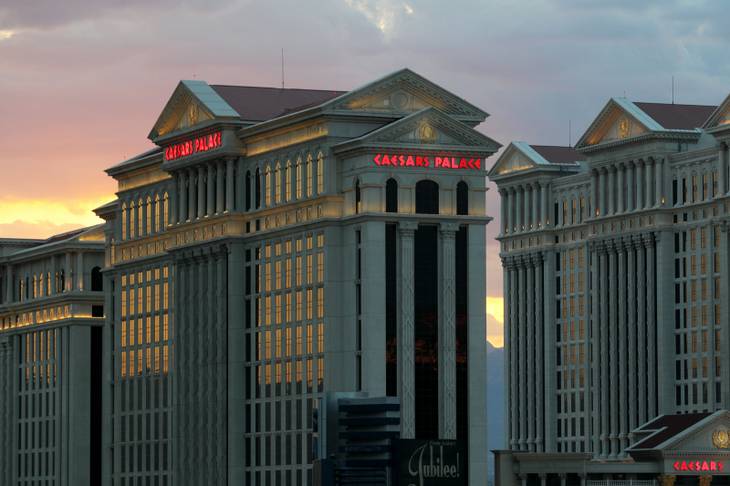Las Vegas-based Caesars Entertainment, operator of Caesars Palace, Bally’s, Paris-Las Vegas, Harrah’s, the Quad, the Flamingo and the Rio in Las Vegas, as well as several properties around the country, reported its third-quarter earnings Tuesday.
Company: Caesars Entertainment (NYSE: CZR)
Revenue: $2.18 billion (down 0.7 percent from the third quarter of 2012). The company reported a 7.1 percent decline in casino revenue of $112.2 million, which was offset by lower promotional expenses and increases in non-gaming revenue.
Losses: $761.4 million (losses increased 50.6 percent from the third quarter of 2012). Interest expenses increased 9.2 percent, by $47.2 million, as a result of the extension of maturities through its Caesars Entertainment Operating Co. subsidiary. The company reported $13 million in gains due to refinancing debt.
Losses per share: $6.03 (losses increased 49.6 percent from the third quarter of 2012).
What it means: While Caesars reported greater losses on declining revenue for the quarter, much of the interest in the company’s conference call was focused on the news last week that the company ended its partnership with Suffolk Downs for a Massachusetts casino as a result of that state’s gaming regulators’ concern about the suitability of a minority investor in Gansevoort Hotel Group, which was partnering with Caesars in Las Vegas.
At the request of Suffolk Downs, Caesars stepped down from the Massachusetts bid and severed its ties with Gansevoort. Caesars CEO Gary Loveman said he was “disappointed and angry” with the outcome, noting that the Gansevoort investor was never charged with a crime.
“On top of the fact that this individual has never been charged or convicted of anything, our arrangement with Gansevoort was limited to the use of the company’s brand on the former Bill’s Gamblin’ Hall & Saloon in Las Vegas,” Loveman said in the conference call. “The hotel and casino were always going to be operated solely by Caesars. The relationship was scrutinized by our time-tested investigative and compliance process and approved by our independent compliance committee, which consists of experienced, accomplished executives and former regulators.”
Loveman said Caesars has about $100 million invested in the Massachusetts bid and regulators didn’t give his company an opportunity to find a resolution to their concerns.
“Our partners chose us because we had a pristine regulatory record,” Loveman said. “In my view, this was quite extraordinary.”
Responding to a question from analysts, Loveman said he had no information about what is motivating the Internal Revenue Service and the Treasury Department’s Financial Crimes Enforcement Network to investigate money-laundering charges at Caesars Palace, which the company disclosed last week in a Securities and Exchange Commission filing.
Caesars continues to struggle with a high level of debt, but made some strides in the quarter in Las Vegas in hotel and food and beverage revenue as a result of new resort fees.
Expense-cutting measures also resulted in $65 million in savings in the quarter, compared with the third quarter of 2012. The company refinanced debt on its Octavius Tower project at Caesars Palace and its Linq project. The company also raised $200 million in a public equity offering, the largest equity issuance since its initial public offering.
Company officials are anticipating high single-digit percentage increases in revenue in Las Vegas in 2014, but continued challenges in regional markets for the year.
The company has started generating revenue from its online poker venture, which launched Sept. 19 under the World Series of Poker brand.
The company also expects to generate $420 million in the fourth quarter when it closes on the sale of a golf course in Macau.
In Atlantic City, Caesars is building what will be the largest convention facility in the Northeast.
Quote: “While we were disappointed with the circumstances in Massachusetts that led to us ultimately withdrawing from our partnership, we have turned our focus back to our ongoing development and repositioning efforts, which are greater catalysts for enhancing the company’s performance. With a stronger capital structure and positive momentum in our core business — both on the development and operations side — I remain quite enthusiastic about our prospects heading into 2014.” — Caesars Entertainment CEO Gary Loveman
